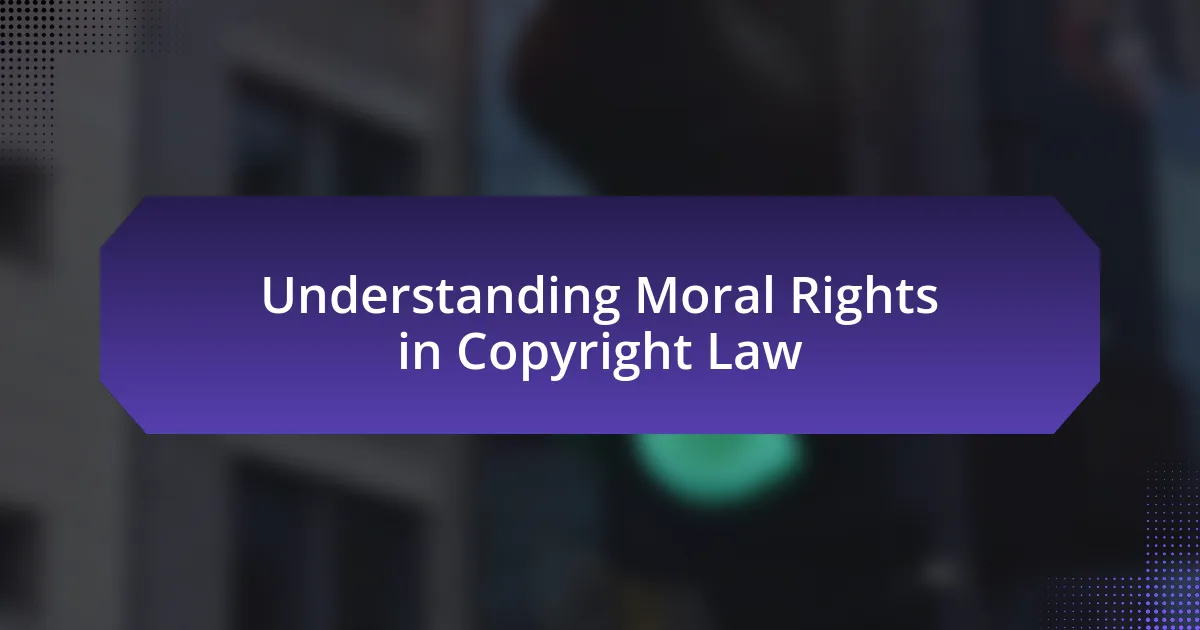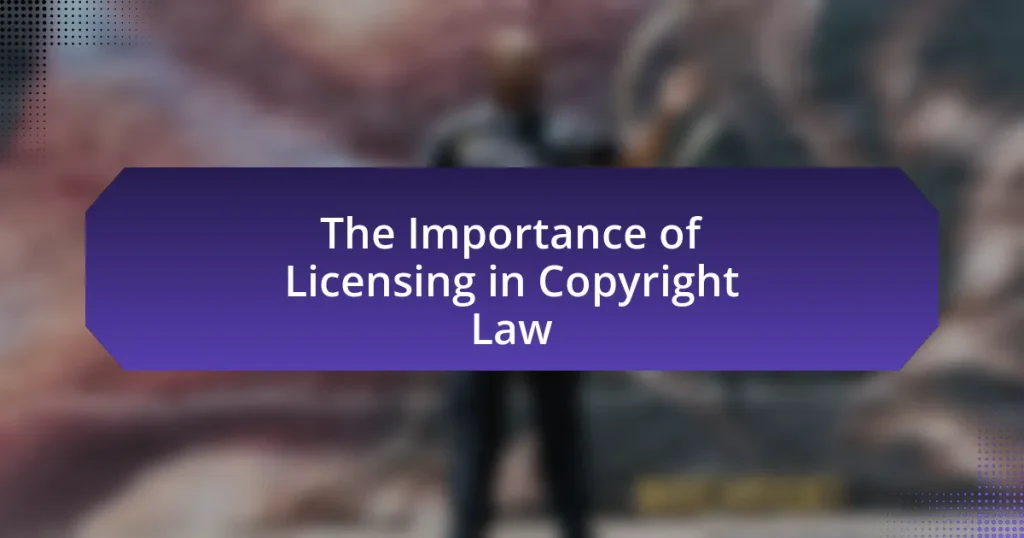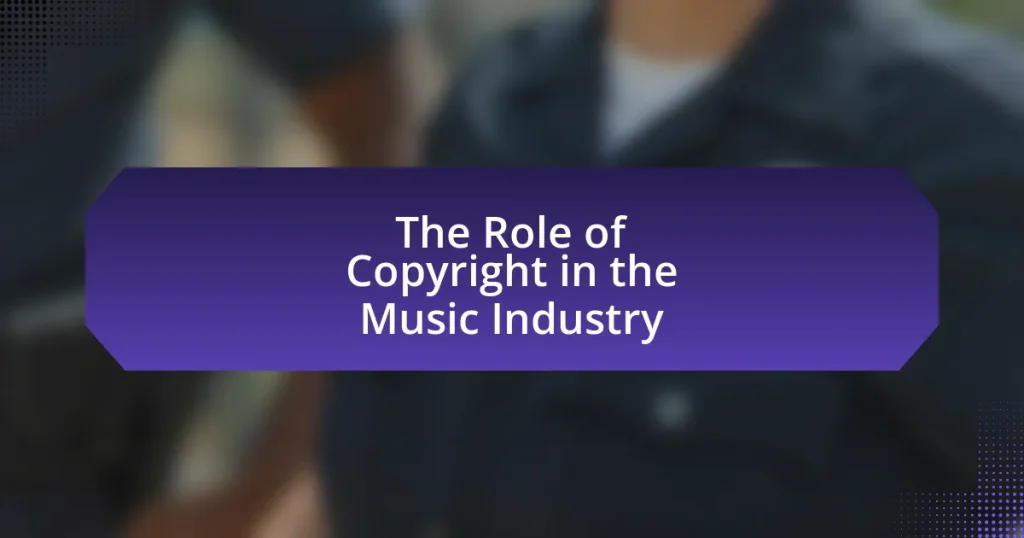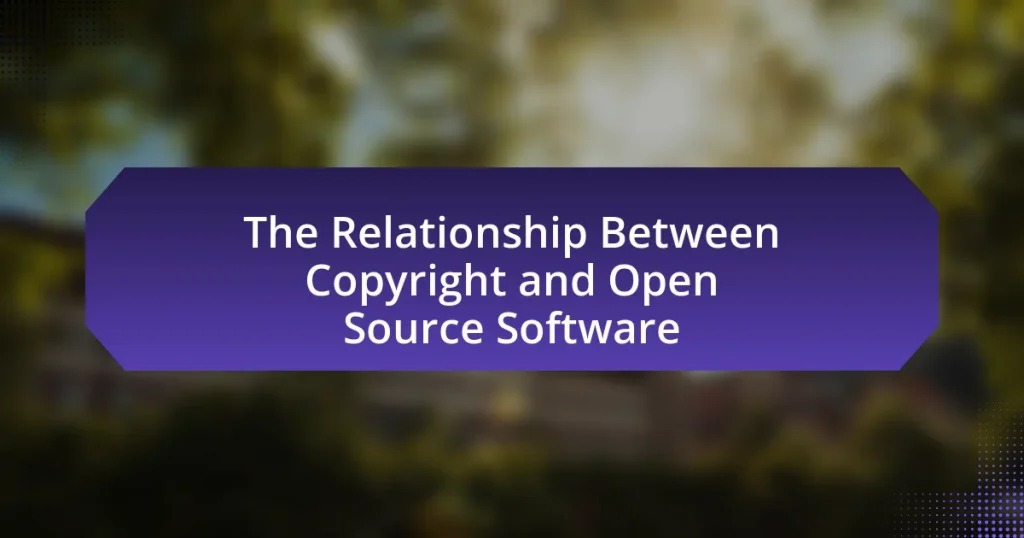Moral rights in copyright law are the rights of creators to protect their personal and reputational interests in their works, encompassing the right of attribution, the right to integrity, and the right to disclosure. These rights differ from economic rights, which focus on financial benefits, and are recognized globally through frameworks like the Berne Convention. The article explores the key components of moral rights, their importance for creators, variations across jurisdictions, and the challenges they face in the digital age, including issues of unauthorized use and the impact of emerging technologies. Additionally, it discusses best practices for creators to uphold their moral rights and the potential for legislative changes to enhance these protections.
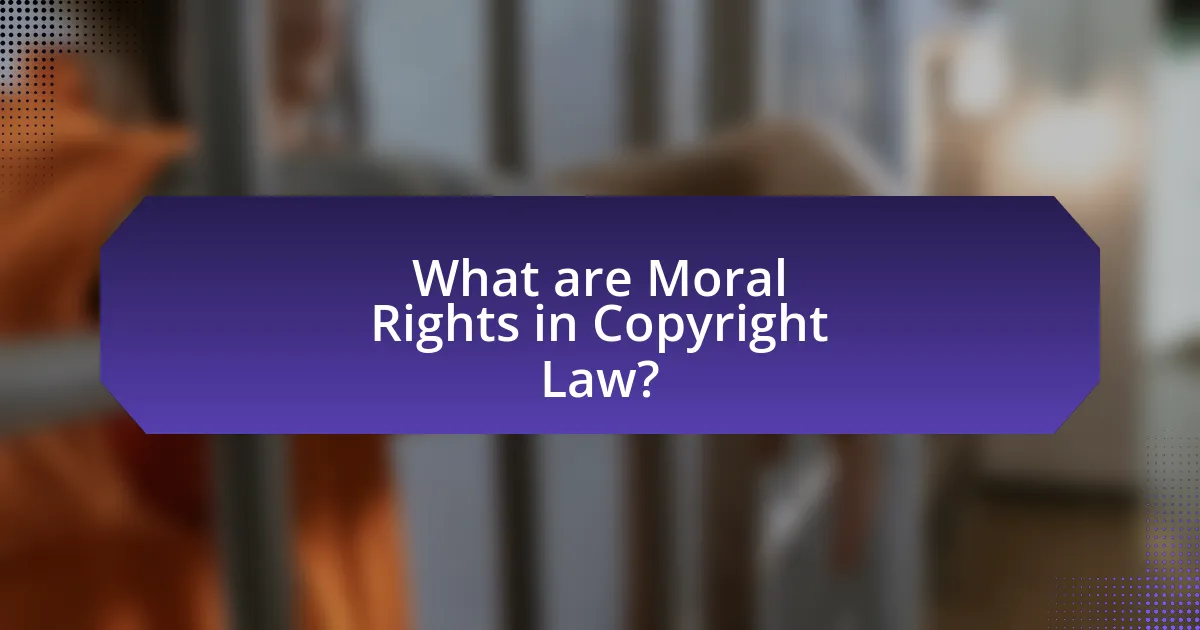
What are Moral Rights in Copyright Law?
Moral rights in copyright law refer to the rights of creators to protect their personal and reputational interests in their works. These rights typically include the right to attribution, allowing creators to be recognized as the authors of their works, and the right to integrity, which protects against alterations or derogatory treatment of the work that could harm the creator’s reputation. Moral rights are recognized in many jurisdictions, including the Berne Convention, which establishes that authors have the right to claim authorship and to object to any distortion or mutilation of their work.
How do Moral Rights differ from Economic Rights?
Moral rights differ from economic rights in that moral rights protect the personal and reputational interests of creators, while economic rights focus on the financial benefits derived from the use of a work. Moral rights include the right to attribution and the right to integrity, ensuring that creators are recognized and that their work is not altered in a way that harms their reputation. In contrast, economic rights allow creators to control the reproduction, distribution, and public performance of their works for monetary gain. This distinction is recognized in various copyright laws, such as the Berne Convention, which emphasizes the importance of both types of rights in protecting creators’ interests.
What are the key components of Moral Rights?
The key components of Moral Rights include the right of attribution, the right to integrity, and the right to disclosure. The right of attribution allows creators to claim authorship of their work and to prevent others from falsely attributing it to someone else. The right to integrity protects the work from alterations or derogatory treatment that could harm the creator’s reputation. The right to disclosure gives creators control over when and how their work is made public. These components are recognized in various copyright laws, such as the Berne Convention, which establishes the framework for moral rights internationally.
Why are Moral Rights important for creators?
Moral rights are important for creators because they protect the personal and reputational interests of authors in their works. These rights ensure that creators can control how their work is used, preventing alterations that could harm their reputation or the integrity of the work. For instance, under the Berne Convention, which many countries adhere to, moral rights include the right to attribution and the right to object to derogatory treatment of the work. This legal framework supports creators by affirming their connection to their creations and safeguarding their legacy in the cultural landscape.
What are the different types of Moral Rights?
Moral rights primarily encompass two types: the right of attribution and the right of integrity. The right of attribution allows creators to claim authorship of their work and to prevent others from falsely attributing the work to someone else. The right of integrity protects creators from any distortion, mutilation, or other modification of their work that could harm their reputation. These rights are recognized in various jurisdictions, including the Berne Convention for the Protection of Literary and Artistic Works, which establishes that moral rights are essential to the protection of the personal and reputational interests of creators.
How does the right of attribution function?
The right of attribution allows creators to claim authorship of their work and to prevent others from falsely attributing the work to someone else. This right functions by ensuring that the creator’s name is associated with their work, thereby recognizing their contribution and maintaining their reputation. In many jurisdictions, this right is protected under moral rights provisions in copyright law, which grant creators the ability to object to any derogatory treatment of their work that could harm their honor or reputation. For example, the Berne Convention for the Protection of Literary and Artistic Works establishes the right of attribution as a fundamental moral right, emphasizing its importance in protecting the integrity of the creator’s relationship with their work.
What is the right of integrity and how is it applied?
The right of integrity is a moral right in copyright law that allows authors to protect their works from distortion, mutilation, or other modifications that could harm their honor or reputation. This right is applied by granting authors the ability to object to changes made to their works that they believe would negatively impact their artistic integrity or the message conveyed by the work. For instance, under the Berne Convention, which many countries adhere to, authors can prevent alterations that would misrepresent their intentions or the quality of their work. This legal framework underscores the importance of maintaining the original form and context of creative works, thereby safeguarding the author’s personal connection to their creation.
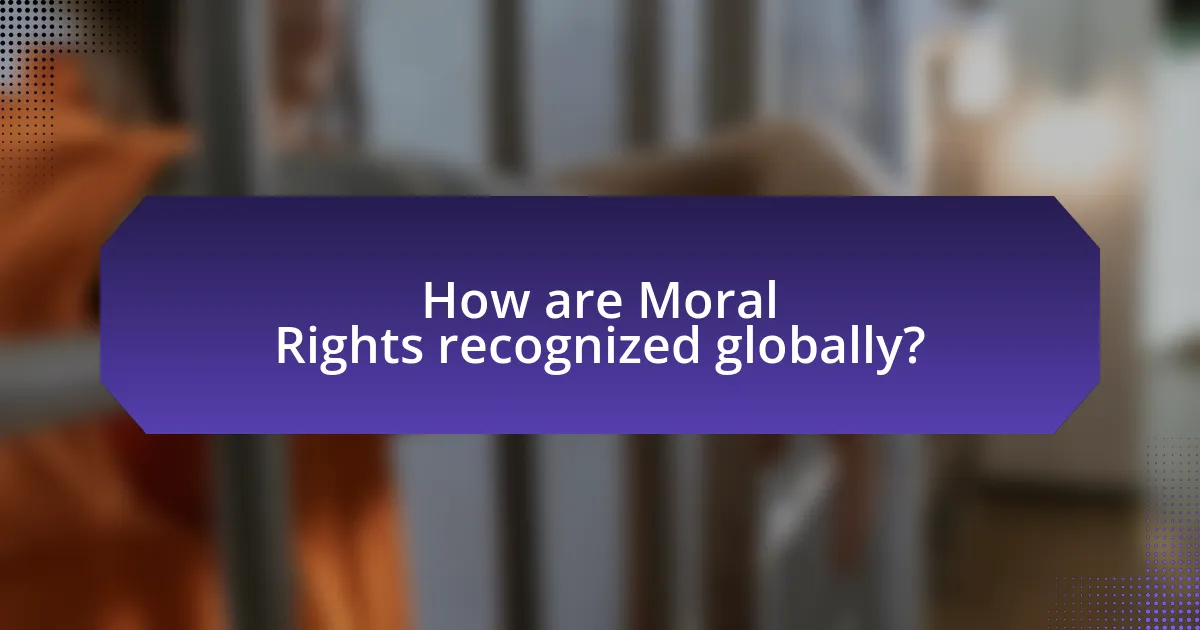
How are Moral Rights recognized globally?
Moral rights are recognized globally through various international treaties and national laws that protect the personal and reputational interests of creators. The Berne Convention for the Protection of Literary and Artistic Works, established in 1886, is a key international treaty that mandates member countries to recognize moral rights, including the right of attribution and the right to integrity of the work. Additionally, countries like France have robust moral rights laws that emphasize the creator’s connection to their work, while other jurisdictions, such as the United States, offer limited moral rights protections primarily through the Visual Artists Rights Act of 1990. This global recognition varies in scope and enforcement, reflecting cultural attitudes towards authorship and creativity.
What are the variations in Moral Rights across different jurisdictions?
Moral rights vary significantly across different jurisdictions, primarily in their recognition, scope, and enforcement. In countries like France, moral rights are robustly protected under the Berne Convention, granting authors rights to attribution and integrity that are inalienable and perpetual. Conversely, in the United States, moral rights are limited and primarily recognized under the Visual Artists Rights Act (VARA), which applies only to certain visual works and does not extend to all authors. Additionally, jurisdictions like Germany and the UK provide varying degrees of moral rights, with Germany offering strong protections similar to France, while the UK has a more limited framework that includes rights of attribution and integrity but allows for waivers. These differences illustrate the diverse approaches to moral rights in copyright law globally.
How does the Berne Convention influence Moral Rights?
The Berne Convention significantly influences moral rights by establishing international standards that protect the personal and reputational interests of authors in their works. Specifically, Article 6bis of the Berne Convention mandates that authors have the right to attribution and the right to object to any distortion or mutilation of their work, thereby ensuring that moral rights are recognized across member countries. This legal framework promotes the recognition of an author’s personal connection to their work, reinforcing the importance of moral rights in copyright law globally.
What are the implications of Moral Rights in the United States?
Moral rights in the United States primarily imply the protection of an author’s personal and reputational interests in their work, which includes the right to attribution and the right to integrity. These rights, while not as robustly recognized as in other jurisdictions like Europe, still influence how creators can control the use of their works. For instance, the Visual Artists Rights Act of 1990 provides certain moral rights to visual artists, allowing them to claim authorship and prevent the destruction or modification of their works that could harm their reputation. This legal framework underscores the importance of recognizing the personal connection between creators and their works, even within a predominantly economic-focused copyright system.
How do cultural factors affect the perception of Moral Rights?
Cultural factors significantly influence the perception of moral rights by shaping societal values and norms regarding authorship and creativity. For instance, in collectivist cultures, the emphasis on community and shared ownership can lead to a perception of moral rights that prioritizes the collective over individual authorship, as seen in countries like Japan and South Korea. Conversely, in individualistic cultures, such as the United States, moral rights are often viewed through the lens of personal expression and individual ownership, which can lead to stronger protections for authors. Research by the World Intellectual Property Organization indicates that these cultural differences can affect how moral rights are legislated and enforced, highlighting the importance of cultural context in understanding moral rights in copyright law.
What role do Moral Rights play in artistic communities?
Moral rights play a crucial role in artistic communities by protecting the personal and reputational interests of creators. These rights ensure that artists can control how their works are used and presented, thereby maintaining the integrity of their creations. For instance, moral rights include the right of attribution, which allows artists to be recognized as the creators of their work, and the right of integrity, which protects against alterations that could harm their reputation. This legal framework fosters a supportive environment for creativity, encouraging artists to produce original works without fear of misrepresentation or exploitation. The recognition of moral rights is evident in various copyright laws worldwide, such as the Berne Convention, which emphasizes the importance of these rights in safeguarding artistic expression.
How do different countries prioritize Moral Rights in their legal systems?
Different countries prioritize Moral Rights in their legal systems based on cultural values and legal frameworks. For instance, France places a strong emphasis on Moral Rights, enshrined in the Code of Intellectual Property, which grants authors perpetual rights to attribution and integrity of their work. In contrast, the United States recognizes Moral Rights primarily through the Visual Artists Rights Act of 1990, which offers limited protection mainly to visual artists, reflecting a more utilitarian approach to copyright. Additionally, countries like Germany and the United Kingdom also recognize Moral Rights, but the extent and enforcement vary, with Germany providing robust protections similar to France, while the UK offers a more moderate approach. These differences illustrate how cultural attitudes towards authorship and artistic integrity shape the prioritization of Moral Rights in various legal systems.
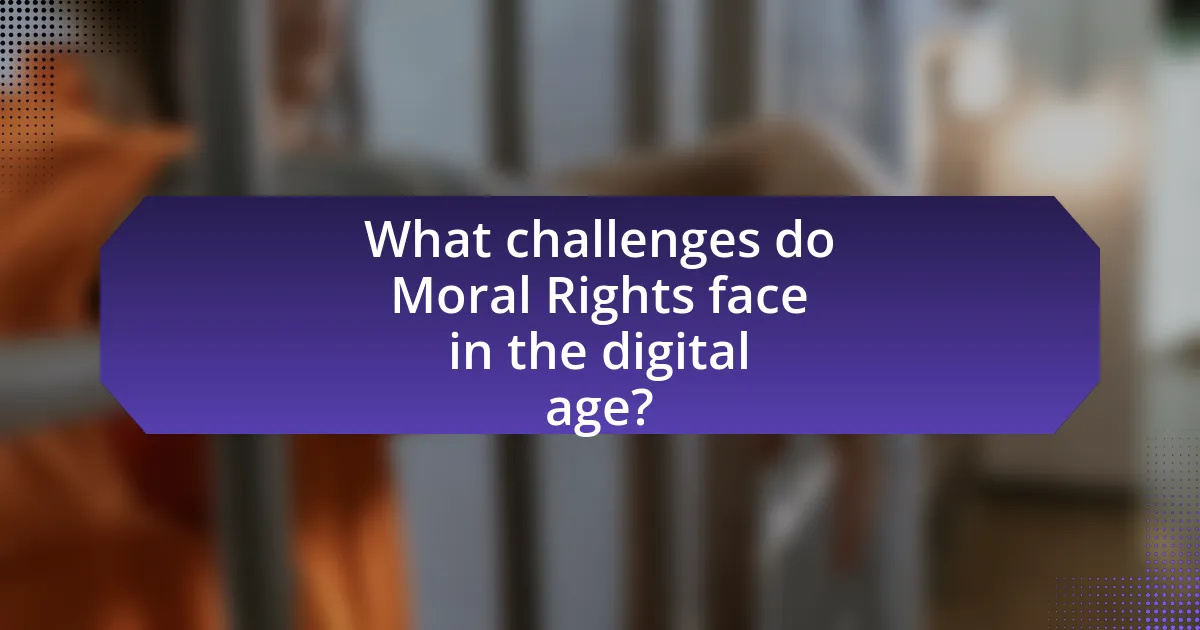
What challenges do Moral Rights face in the digital age?
Moral rights face significant challenges in the digital age primarily due to the ease of reproduction and distribution of digital content. The digital environment allows for unauthorized use and alteration of creative works, undermining the integrity and attribution rights that moral rights protect. For instance, the rise of social media platforms facilitates the rapid sharing of content without proper credit to the original creators, which directly violates the moral right of attribution. Additionally, the global nature of the internet complicates enforcement, as moral rights vary by jurisdiction, leading to inconsistencies in protection. According to a study by the World Intellectual Property Organization, the lack of harmonization in moral rights legislation across countries exacerbates these challenges, making it difficult for creators to assert their rights effectively in a digital landscape.
How has the internet impacted the enforcement of Moral Rights?
The internet has significantly complicated the enforcement of Moral Rights by facilitating widespread distribution and reproduction of creative works without proper attribution. This ease of access often leads to violations of an artist’s right to attribution and integrity, as unauthorized use of their work proliferates online. For instance, a study by the World Intellectual Property Organization (WIPO) highlights that digital platforms enable users to share and modify content rapidly, often bypassing the original creator’s consent, which undermines the essence of Moral Rights. Additionally, the global nature of the internet creates jurisdictional challenges, making it difficult for creators to pursue legal action against infringers located in different countries.
What are the common violations of Moral Rights online?
Common violations of Moral Rights online include unauthorized alterations of an artist’s work, failure to attribute the creator, and the distribution of works in a manner that harms the creator’s reputation. Unauthorized alterations occur when someone modifies or adapts a work without the creator’s consent, which can distort the original intent. Failure to attribute happens when a work is shared or published without proper credit to the original creator, undermining their recognition. Lastly, distributing works in a way that negatively impacts the creator’s reputation, such as associating their work with inappropriate content, constitutes a violation of their moral rights. These violations can lead to legal repercussions under copyright law, emphasizing the importance of respecting creators’ rights online.
How can creators protect their Moral Rights in a digital environment?
Creators can protect their Moral Rights in a digital environment by ensuring proper attribution, maintaining the integrity of their work, and utilizing digital rights management tools. Proper attribution involves clearly stating the creator’s name and the original source whenever their work is used, which helps uphold their right to be recognized as the author. Maintaining the integrity of their work means taking steps to prevent alterations or misrepresentations that could harm their reputation. Digital rights management tools, such as watermarks and licensing agreements, can help enforce these rights by controlling how their work is distributed and used online. These measures are essential as they align with the principles of Moral Rights, which are recognized in various copyright laws globally, including the Berne Convention, emphasizing the importance of protecting the personal and reputational interests of creators.
What are the future trends regarding Moral Rights?
Future trends regarding Moral Rights indicate a growing recognition and expansion of these rights globally, particularly in digital environments. As technology evolves, there is an increasing emphasis on protecting the personal and reputational interests of creators, especially in the context of online content sharing and artificial intelligence. For instance, countries like France and Germany are leading the way in strengthening moral rights legislation, which includes the right to attribution and the right to integrity, reflecting a shift towards more robust protections for creators. Additionally, the rise of digital platforms has prompted discussions about how moral rights can be adapted to address issues such as unauthorized modifications of works and the ethical use of AI-generated content. This trend is supported by various international treaties and agreements that advocate for the enhancement of moral rights in the face of technological advancements.
How might emerging technologies influence Moral Rights?
Emerging technologies may significantly influence Moral Rights by altering how creators maintain control over their works and how those works are used and distributed. For instance, advancements in digital distribution and artificial intelligence can lead to unauthorized reproductions or adaptations of creative works, challenging the integrity and attribution aspects of Moral Rights. The rise of blockchain technology offers potential solutions by providing immutable records of authorship and usage, thereby reinforcing the protection of creators’ rights. Additionally, the increasing use of algorithms in content creation raises questions about the attribution of authorship, as AI-generated works may complicate traditional notions of creator identity and moral claims.
What legislative changes are being proposed for Moral Rights?
Legislative changes proposed for Moral Rights include enhancing the protection of authors’ rights to attribution and integrity of their works. These changes aim to strengthen the legal framework surrounding Moral Rights, ensuring that creators have greater control over how their works are used and presented. For instance, some proposals suggest extending the duration of Moral Rights and expanding their applicability to digital platforms, reflecting the evolving nature of content distribution. These changes are supported by ongoing discussions in copyright law reform, emphasizing the need to adapt to technological advancements and the global nature of creative industries.
What best practices should creators follow to uphold their Moral Rights?
Creators should ensure they are properly credited for their work to uphold their Moral Rights. This includes explicitly stating their authorship in any public display or distribution of their creations. Additionally, creators should maintain the integrity of their work by preventing unauthorized alterations or adaptations that could distort their original message or intent. Legal frameworks, such as the Berne Convention, support these practices by recognizing the right of attribution and the right to object to derogatory treatment of a work. By adhering to these best practices, creators can effectively protect their Moral Rights and maintain their artistic integrity.
